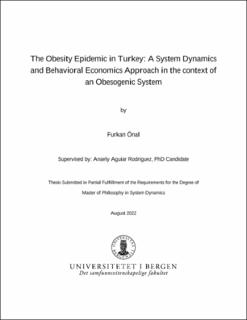The Obesity Epidemic in Turkey: A System Dynamics and Behavioral Economics Approach in the context of an Obesogenic System
Master thesis
Permanent lenke
https://hdl.handle.net/11250/3011703Utgivelsesdato
2022-08-09Metadata
Vis full innførselSamlinger
- Master theses [125]
Sammendrag
Obesity is an increasing problem across the world, and it has risen dramatically in the last decades. It is a major risk factor for noncommunicable diseases which are the world’s leading cause of death. In Turkey, the obesity epidemic is becoming a growing concern. Policies against obesity have had minimal success thus far. Given this issue, the aim of this study is to analyze the underlying structure of the obesity problem from a system’s perspective since the obesogenic system is a complex adaptive system. Therefore, this study uncovers the dynamic interactions within this system and resulting behavior patterns by developing a system dynamics simulation model. Furthermore, behavioral economics and reinforcement pathology frameworks are integrated into the model to provide policymakers with more robust insights. This thesis employs a system dynamics methodology to analyze aggregated level interactions between system components to understand complex systems. Combining system dynamics with behavioral economics and reinforcement pathology frameworks provides a guide to this complex adaptive system to understand how the obesogenic environment shapes individual decision-making. A theoretical model developed to show how reinforcement pathology occurs within the obesogenic environment, as well as the feedback loop analysis to identify important feedbacks within the system. Thereafter, the theoretical model quantified into a system dynamics simulation model that generates the behavior pattern and trend from endogenous interactions for further analysis of the system. According to the findings, the obesogenic environment is a complex adaptive system where ingestive behavior is shaped by the environment as well as the environment is influenced by the ingestive behavior. It was found that this system is dominated by many uncontrolled powerful reinforcing feedback loops at various levels interacting with each other. In addition, the study found that reinforcement pathology framework integrated to system dynamics methodology shows how environmental factors are making food consumption more valuable, more reinforcing within this adaptive system, hence affecting individual behavior. Additionally, the study also identified several leverage points to intervene obesogenic system namely intervening reinforcement pathology feedback loop by creating substitutes for food, the weak balancing feedback loop that fails to balance the relative reinforcing value of food and lack of rules within the system especially mechanisms that reward individuals with healthier lifestyle. In conclusion, the study showed that without a clear understanding feedback mechanisms working within an obesogenic environment and interventions that aim to address those feedback processes may result in less effective policies. This research sheds some light into understanding the obesity problem as a complex adaptive system and how the system can be leveraged to help reduce obesity rates.
Utgiver
The University of BergenOpphavsrett
Copyright the Author. All rights reservedBeslektede innførsler
Viser innførsler beslektet ved tittel, forfatter og emneord.
-
Synthesizing System Dynamics and Geographic Information Systems in a new method to Model and Simulate Environmental Systems
Gharib, Sameh (Doctoral thesis, 2008-12-12)A new method to synthesize system dynamics (SD) with geographicinformation systems (GIS) is presented in this research. This new method employsthe Object Oriented Paradigm (OOP) as a common platform for the integrationprocess. ... -
Food provision and environmental goals in the Swiss agri-food system: System dynamics and the social-ecological systems framework
Kopainsky, Birgit; Huber, Robert; Pedercini, Matteo (Peer reviewed; Journal article, 2015-07)An important challenge for the Swiss agri-food system is how to align food provision with environmental goals in the context of increasingly complex conditions. This paper describes a system dynamics model that analyses ... -
Systems Engineering Applied to Evaluate Social Systems: Analyzing systemic challenges to the Norwegian welfare state
Palmer, Erika (Doctoral thesis, 2017-12-01)The Norwegian welfare state is one of the most generous in the world providing social security through universal healthcare, education and childcare. Elderly Norwegians also face a relatively secure retirement with a solid ...
